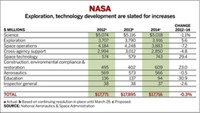Advertisement
Grab your lab coat. Let's get started
Welcome!
Welcome!
Create an account below to get 6 C&EN articles per month, receive newsletters and more - all free.
It seems this is your first time logging in online. Please enter the following information to continue.
As an ACS member you automatically get access to this site. All we need is few more details to create your reading experience.
Not you? Sign in with a different account.
Not you? Sign in with a different account.
ERROR 1
ERROR 1
ERROR 2
ERROR 2
ERROR 2
ERROR 2
ERROR 2
Password and Confirm password must match.
If you have an ACS member number, please enter it here so we can link this account to your membership. (optional)
ERROR 2
ACS values your privacy. By submitting your information, you are gaining access to C&EN and subscribing to our weekly newsletter. We use the information you provide to make your reading experience better, and we will never sell your data to third party members.
Environment
NASA: Plan Scales Back Mars Exploration Activities
by Susan R. Morrissey
February 27, 2012
| A version of this story appeared in
Volume 90, Issue 9
The President proposes a slight drop in funds for the National Aeronautics & Space Administration in fiscal 2013. The $17.7 billion request—down 0.3%, or $59 million, from 2012—builds on the agency’s current space infrastructure and prioritizes technologies and capabilities for future space travel.
The proposed budget, however, also includes cuts in areas such as planetary science and astrophysics to balance the requested increases. “Tough choices had to be made,” NASA head Charles F. Bolden Jr. said at the budget rollout.
One area that would see funding growth is Earth science. Some $1.8 billion, up 1.4%, would support NASA’s fleet of Earth observation spacecraft aimed at collecting data on climate change, the environment, and natural disasters. The 2013 budget also would provide $628 million, up 21% from 2012, to get the James Webb Space Telescope on schedule to launch in 2018.
For human space exploration, the budget proposes $830 million to develop commercial capability to transport crew to the International Space Station. The amount would be more than twice the $406 million the program received in 2012. The budget also would provide $2.9 billion for the continued development of a deep-space crew capsule and a heavy-lift rocket to launch humans into space. That amount is down about 7% from the 2012 level.
To balance the requested increases, NASA proposes to streamline agency operations and to cut funding of the Mars robotic exploration program by nearly 40%, to a total budget of $361 million. The request would also end plans for the ExoMars mission, a joint effort with the European Space Agency to explore the red planet.
MORE ON THIS STORY
- - NSF: PRESIDENT MAINTAINS GROWTH FOR CORE RESEARCH
- - NIH: FUNDING IS FLAT, BUT TRANSLATIONAL SCIENCE GROWS
- - DEFENSE: SCIENCE & TECHNOLOGY HOLD THEIR OWN
- - DHS: SCIENCE & TECHNOLOGY OFFICE GETS RAISE
- - ENERGY: MORE DOLLARS FOR CLEAN AND RENEWABLE ENERGY R&D
- - COMMERCE: R&D FUNDING IS UP AT NIST, DOWN AT NOAA
- - AGRICULTURE: RESEARCH FUNDS DECLINE
- - EPA: FUNDS FOR SCIENCE & TECHNOLOGY UP
- - NASA: PLAN SCALES BACK MARS EXPLORATION ACTIVITIES
- - INTERAGENCY INITIATIVES: EDUCATION, CLIMATE SCIENCE, NANOTECH ALL GROW




Join the conversation
Contact the reporter
Submit a Letter to the Editor for publication
Engage with us on Twitter